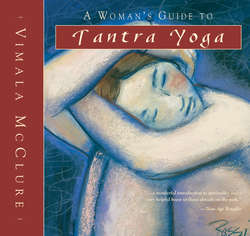Читать книгу A Woman's Guide to Tantra Yoga - Vimala McClure - Страница 17
На сайте Литреса книга снята с продажи.
ARE YOU BOUND BY FATE?
ОглавлениеThrow a rock into a pool of still, clear water. What happens? The water reacts. It changes shape, emanating rings of waves that are strongest at the point of contact. The reflection of the moon above is broken up into a thousand moving pieces, made unrecognizable.
Do you love your son? That is perfectly correct. But on the son’s death you will have great pain. Isn’t that also correct? The son is a finite entity. He cannot live until eternity. He will depart and leave you. But if you treat your son as the expression of God in the form of your son, then there will never be any fear of losing him because God can never be lost. It is present around you in all directions. In that state of mind you will be able to give proper treatment to whatever finite being you come in contact with.
— P. R. Sarkar
The mind is always in a state of motion, experiencing the reactions of previous thoughts and actions, like rocks thrown incessantly into the peaceful stillness of a pool. Meditation helps you to put down the rock, let the waters settle, and peer in to see the beautiful reflection of your perfect nature. When you experience this oneness with infinite consciousness, you begin to free yourself from the shackles of so-called fate.
Throughout the ages, people have sought to explain the seemingly random occurrences in their lives. Some religions teach that God (often perceived as a stern, manlike figure in the sky) rewards the virtuous and punishes those who sin. These philosophies must undergo tremendous contortions of logic to withstand the questions of rational people. Hindu “fatalists” assert that every action has its consequences and the sufferings of this life have their prologue in previous incarnations. But because of the limitations of religious dogma, these ideas spawned the caste system in India, whereby millions of people have suffered, kept ignorant and poor by the dictum that it was their fate, decreed by the gods. Better luck next life! Newton’s famous assertion that for every action there is an opposite reaction is a basic physical law that applies on the level of mind as well. The mind’s balance is constantly disturbed by thoughts, actions, impressions. It seeks to regain its original state and strives with force to correct imbalances.
Every thought or action reaps its reaction. Nothing is lost. The universe, according to the theory of relativity, is curved in on itself. If you could throw an object into space with enough force, it would traverse the universe and come round again to hit you in the back of the head. In the same way, every vibration emanating from you — whether thought, word, or action — will return, with force, to affect your life for good or ill. These potential reactions, called samskaras, are the results of thoughts and actions. They remain stored in the mind until mature and are then experienced as “the forces of blind fate.” They have their own energy, their own momentum. According to Tantric teachings, this momentum — more accurately called “reactive momenta” — can only mature when the mind is dissociated from its incessant concern with the physical body, as in unconsciousness or death. In the state after death, when the mind is dissociated from the body, momenta from the previous life mature, and when the soul incarnates again in a suitable physical body, those reactions are experienced and new ones are created. Thus the wheel of birth and death turns ceaselessly.
In meditation you momentarily dissociate yourself from concern with the physical body, not in simulation of death, but by identifying with the eternal source of all life. This is another opportunity for reactive momenta to mature. But within your practice lies the key that will stop the relentless turning of the wheel. Each time you meditate, some of the reactive momenta mature. Returning to your everyday life, you experience these reactions, reaping what you have sown in this and previous lives. This is why sometimes, especially in the beginning, the new practitioner faces a period of difficulties and obstacles. She undergoes more reactions than the ordinary person. But this phase passes, leaving the meditator freer than before; fewer and fewer potential reactions are created as her meditation gains strength and concentration.
The more you meditate, the more you attain equilibrium in every sphere of your life. You begin to perceive the same infinite consciousness pervading all, and thus your mind isn’t disturbed by any situation. With no disturbance, there is no need to correct the disturbance, no reaction. Meditation ripens the old reactive momenta and enables you to stop creating new ones. By experiencing your old reactions without attachment, you let them go. Eventually all of your old reactions are exhausted and no new ones appear to be experienced. Your mind has achieved a state of peace, and the body is no longer needed as a vehicle for the expression of reactive momenta. At the end of a practitioner’s life, her reactions are finished, and, upon leaving her earthly body, her mind merges into infinite consciousness.
